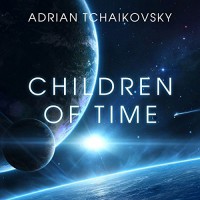

I'm surprised to find myself abandoning this book a quarter of the way through (a little over four hours of listening). I really enjoyed Adrian Tchaikovsky's "The Dogs Of War" and I expected "Children Of Time" to be even better. I settled down for sixteen hours of epic science fiction and found that although the scale was epic, I storytelling was flat.
The opening chapters, that set up the whole multi-millennia premise worried me, They were dominated by a cardboard cutout, mad-scientist character, walking through the action with all the conviction of the early episodes of Babylon 5. Then we got to the spiders. Spiders! Who the hell likes spiders? Well… I do it seems. Unlike the humans, they seemed real and interesting and unpredictable.
This left me wondering if Tchaikovsky made the humans so clichéd to make it easier to sell the spiders? Or was he just too bored by the early chapters to do more than sketch the people he was condemning to death? Or does he just have the kind of sense of humour that likes to deadpan the apparent end of the human race?
For a while, I didn't care. So what if the humans were naff? I wanted to know more about the (God help me) GIANT spiders.
By the time I got to the third generation of spiders and the next set of humans, I had a better understanding of what was going on and why this book won the 2016 Arthur C Clarke Award.
The premise of the story is a very clever way of looking at evolution (even when it's being interfered with by a human-crafted virus) from the perspective a view quite alien to the human way of thinking and then setting up a struggle for survival with humans whose history has left them desperate and weak and stripped of their hubris. It's one of the best ideas I've seen since Brian Aldiss' "Heliconia" books. The scale is epic both in terms of time and in the range of ideas. All of the thinking works.
I'm abandoning it, after four hours, because I don't care enough about the content to read through another twelve hours.
I think the scale is the problem. Tchaikovsky is more interested in describing the watch the blind watchmaker is building than in any of the moving parts. This means that the spiders quickly become interesting mainly as the vessels via whom the engineered virus transmits itself between generations and shapes the evolution of the species.
After a while, species, including humans, don't interest me. What happens to individuals in the species matters but when we look down across the vast sweep of history, people become footnotes at best.
Maybe, when the two storylines intersect, Tchaikovsky will deliver the same intense focus that I enjoyed in "The Dogs Of War" but I think this is one of those Science Fiction books that I don't get along with because they are too much of a thought experiment and not enough of a story.

 3
3









